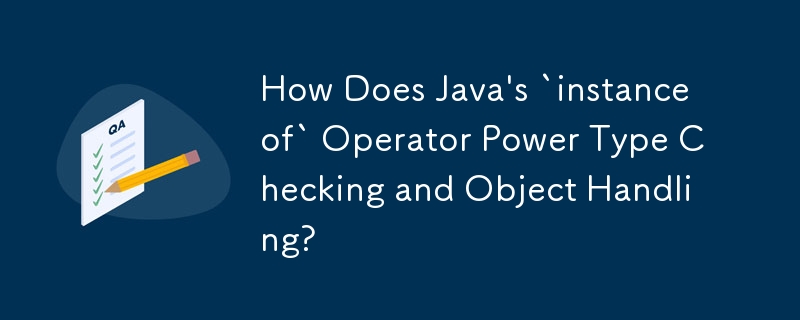 Java
Java
 javaTutorial
javaTutorial
 How Does Java's `instanceof` Operator Power Type Checking and Object Handling?
How Does Java's `instanceof` Operator Power Type Checking and Object Handling?
How Does Java's `instanceof` Operator Power Type Checking and Object Handling?

Java's Versatile 'instanceof' Operator: Exploring Its Type-Checking Power
This programming technique serves as a crucial tool in object-oriented programming, allowing Java programmers to scrutinize the type of an object at runtime.
One notable usage of instanceof centers on conditional statements, where it effectively discerns between object types and prompts the execution of specific code blocks based on its findings. Consider the following example:
if (source instanceof Button) {
// Execute code for Button objects
} else {
// Handle objects that aren't Buttons
}In this case, the source object is assessed against the Button type. If it's a Button, the first block is triggered; otherwise, the second block executes.
Beyond conditional statements, instanceof emerges as a key player in object type casting. By inspecting the type of an object at runtime, it can guide the casting process, ensuring data integrity and preventing exceptions.
At the heart of instanceof lies its ability to validate hierarchical relationships within classes. For instance, if an object is an instance of a specific class or implements a designated interface, instanceof can confirm this inheritance linkage.
class Animal {}
class Dog extends Animal {}
Dog dog = new Dog();
boolean dogIsAnimal = dog instanceof Animal; // trueHowever, it's crucial to note that instanceof only examines inheritance, not method implementations or interface methods. It would be erroneous to assume a derived class inherits all the methods of its parent.
Moreover, instanceof operates dynamically, assessing the type of an object at runtime rather than compile time. This functionality proves invaluable when dealing with polymorphic objects whose types may change during program execution.
The above is the detailed content of How Does Java's `instanceof` Operator Power Type Checking and Object Handling?. For more information, please follow other related articles on the PHP Chinese website!

Hot AI Tools

Undresser.AI Undress
AI-powered app for creating realistic nude photos

AI Clothes Remover
Online AI tool for removing clothes from photos.

Undress AI Tool
Undress images for free

Clothoff.io
AI clothes remover

AI Hentai Generator
Generate AI Hentai for free.

Hot Article

Hot Tools

Notepad++7.3.1
Easy-to-use and free code editor

SublimeText3 Chinese version
Chinese version, very easy to use

Zend Studio 13.0.1
Powerful PHP integrated development environment

Dreamweaver CS6
Visual web development tools

SublimeText3 Mac version
God-level code editing software (SublimeText3)

Hot Topics
 1384
1384
 52
52

